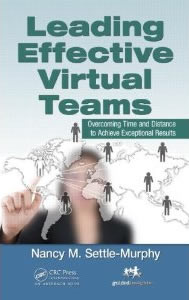Celia, Ben’s new team leader in Milan, seemed completely committed to delivering a crucial marketing plan on time when they spoke earlier this week. Trouble is, she hasn’t. So far, Ben has sent two “friendly” emails, and just now he sent Celia an IM “just to see where we are.” Celia’s tone has become increasingly cool. Ben is at a loss. He knows that cultures regard punctuality differently and he’s aware that Celia may regard him as a micromanager. Still, that marketing plan must be on his VP’s desk tomorrow, or his team may lose all of the needed funding.
In essence, Ben is no longer sure he can count on Celia to deliver on her commitments. Celia, meanwhile, is upset that Ben feels compelled to check in so frequently. After all, she’s working as fast as she can, and she’s not really late yet, at least according to her calculations. Since they have few, if any, opportunities to sort out their differences in real-time, this once-promising relationship is now at risk.
Cultivating trust is one of the most critical success factors for any global team. It’s also the hardest. Once breached, trust is exceedingly difficult to repair, given the rare opportunities for frequent, meaningful interaction. For cross-cultural teams, relationship-building is even harder, since it’s so easy to misinterpret each other’s intentions and make incorrect assumptions in the absence of visual cues.
Joining me in authoring this month’s issue are Caroline Beery and Manuel Heidegger, Director and Manager of Argonautonline, an online cultural assessment and eLearning tool. This article, the first of a series, will focus on how different attributes, behaviors and attitudes are seen as trustworthy (or not) by a handful of cultures. Although it’s true that all people deserve to be treated as individuals, virtual team leaders can accelerate the process of building trust across their teams by understanding certain patterns of behaviors within cultures.
Please note: We follow “trust-building” tips with “trust-busting” tips for each of the cultures below.
From a U.S. perspective:
- Trust-building tips:
- Be reliable and punctual. If you make a commitment to deliver something by a certain time, I will expect you to follow through, unless you alert me that you can’t. In this case, I’ll want to understand why you can’t deliver on the commitment, though I may not come out and ask you.
- Give it to me straight. Please be candid and clear in your communications to me. I’m usually in a hurry, so I typically take things at face value. I’m not comfortable with ambiguity, so please be explicit.
- Treat everyone as equals, like we’re all playing on the same team. (And by the way, I love sports analogies, as long as they refer to a sport we play in the U.S.) We prize our democratic process and like to have everyone’s input included in most decisions, since we just can’t stand hurting anyone’s feelings.
- Be prepared to act quickly and decisively. Protracted, deliberate decisions can be such a waste of time! Checking off the items on my task list as quickly as possible is important to me, and I’d rather move forward ASAP, even if it means we may need to stop later to undo a quick decision we made.
- Trust-busting tips:
- Show off your pedigree. Tell me where you went to school, what degree you earned, your title, extensive experience — anything to make you seem important. Express doubt about my credentials or experience, whether in your tone or choice of words.
- Stick with the formalities. Insist on protocols and tell me I must “respect the hierarchy,” especially when I need to urgently share or access information across the team.
- Force me to slow down by throwing red tape and nonsensical rules in my way, for no apparent reason.
From an Indian perspective:
- Trust-building tips:
- Give me a chance to tell you the full story when you’re asking about the status of my project, instead of asking for simply a “yes” or “no.”
- Realize that I feel uncomfortable saying “no” explicitly, and will find many subtle ways to convey news that you may not want to hear.
- Let me hear you appreciate what we’re doing right, at least sometimes!
- Realize that I tend to collaborate with my colleagues to get most of my work done, and I would like them to be involved in most of our discussions.
- Remember that a good relationship between us is more important than today’s deadline. Allow time for small talk and ask how I am once in a while, even if I may not feel entirely comfortable asking you the same.
- Trust-busting tips:
- Begin every meeting by reminding me about your ground rules, especially ones I don’t buy into. (But since you’ve never asked, you wouldn’t know!)
- Ask me to repeat myself several times, saying that you can’t understand my accent.
- Focus on the mistakes, slipped schedules and “what we need to improve” instead of asking me what I think might help move the project along.
- Stress the importance of deadlines, as though I have forgotten them!
From a German perspective:
- Trust-building tips:
- Please show up at our agreed-upon time, if not a little early. Punctuality is an important sign of respect in my world.
- Allow me time to speak. I tend to be deliberate in my thinking and need time to formulate and articulate my thoughts.
- Come to the table with details, evidence, facts, context and background to support your opinions and ideas. I am a reasonable person and feel better when everything is spelled out.
- Give me time to solve earlier challenges before progressing to new ones. I feel more relaxed when I can tackle one thing at a time, in a logical order.
- Run meetings efficiently. Provide us with a clear agenda in advance. Help us to stay on track and on time. I don’t tolerate frivolous or meandering conversations very well.
- Trust-busting tips:
- Rush me into making a decision or completing an impossible workload in an unrealistic amount of time. Certain things simply cannot be rushed, especially if I want to deliver the highest-quality work. (And I almost always place quality over speed, given the choice!)
- Ignore hierarchy or established protocol, especially when it comes to getting or giving information. Go directly to my manager (or even higher) if you feel you waited long enough for my response.
- Dismiss deadlines and schedules as though we never even talked about them. Reassure me that “it’s better late than never” when you delay responding to my urgent request for crucial information.
- Assume that I will automatically enjoy an informal collegial relationship with you right at the outset. Don’t bother following my culture’s usual conventions for meetings, emails, or other forms of communication. Use overly familiar language when speaking to me or sending emails. Ask me intrusive questions about my private life even though you hardly know me.
- Always deliver the “good news” before telling me the real story. This confuses me, and makes it much harder for me to know how to respond, especially without visual cues.
From a French perspective:
- Trust-building tips:
- Give me the big picture and spare me the details unless I ask for them. I like to view a problem or solution holistically before I dive into the minutiae.
- Be prepared for a vigorous debate. I relish a stimulating discussion and thrive on repartee. (If I don’t offer some mild criticism, that could mean I find your ideas uninteresting!)
- Respect the chain of authority. We may seem a bit informal when we’re chatting, but in fact, there’s an important hierarchy that you need to pay attention to.
- Accept that employees may expect strong supervision and feel comfortable with a directive, persuasive supervisor, so you may need to modify your leadership style if you want my respect.
- Praise my ideas (only if they’re praiseworthy!) The highest compliment you can give me is to acknowledge the clarity and logic of my rationale.
- Trust-busting tips:
- Refuse to participate in a spirited debate. I may assume that your ideas aren’t well-thought-out or that you lack the confidence to defend them.
- Give me directives or communicate decisions without explaining why. I am more likely to accept things that are out of my control if I can understand the logic behind them. Expecting me to follow orders without understanding the context is a sure way to demotivate and frustrate me.
- Expect me to take responsibility for decisions and actions without specific authorization. I’m not the one ultimately responsible here, and I often need to check with my boss.
- Ignore past accomplishments and traditions in favor of always looking forward. I know that we need to move ahead, but I also need you to acknowledge the history, traditions and accomplishments of our company and culture.
- Expect me to work during my own private time: nights, weekends and holidays. My private time is sacrosanct, and I resent your assumption that I should sacrifice my personal time due to someone else’s poor planning or failure to prioritize. And please, no facetious remarks about the number of weeks I get for vacation. That’s the law in my country. And besides, we both know you’d take extended summer vacations, too, if you could.
Building trust in teams is critical to successful team performance. In culturally diverse, remote teams, the “trust-busting” factors increase exponentially. Silence can be misinterpreted, languages are different, we lack body language clues, face-saving issues are mishandled, attitudes to deadlines vary, the role of the “boss” differs. Navigating these differences remotely is a minefield.
The above tips for building trust in multicultural teams are not absolute solutions, but are suggestions for moving up the “trust-building scale.” The next time you are leading a multicultural team (or are acting as a team member), be on the lookout for some of these situations and try a trust-building tip!
Links
Past Communiqués: Building Trust Within Virtual Teams – Small Steps Add Up, 11 Expert Tips for Great Global Teams, Mobilize Global Teams by Avoiding 8 Common Landmines




